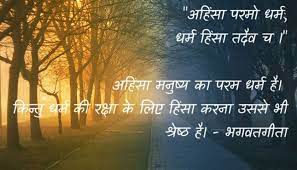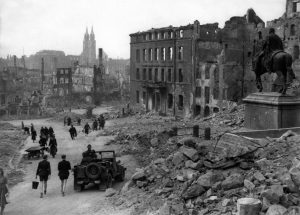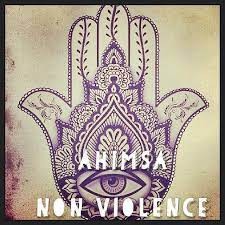
“अहिंसा परमो धर्मः, धर्म हिंसा तथीव च” |
Non-violence is the ultimate Dharma of man. But doing violence to protect Dharma is even better than that.
Ahimsa is only loosely translated as non-violence. Unlike the English word 'non-violence' (which is absolute in its meaning), ahimsa means non-violence in a relative sense. There are times when violence can also be considered ahimsa if that violence is used to stop greater violence. For example, a king should always raise his rod of chastisement to keep peace and order in his country. He will fail to discharge his duty if he does not punish the wicked, and his government will be in a state of utter chaos. To hang a murderer is Ahimsa for a king. To kill a man who is taking away the lives of many is Ahimsa. Hence Sanatana Dharma did not impose total non-violence on its followers except in the case of ascetics. Ahimsa is general dharma that is superseded with himsa (violence) to protect dharma. However, one must remember that the word Dharma is not a synonym of Religion. No religions existed then.
O Pandava! My promise is inevitable that I kill those who are destroyers of Dharma for the establishment of Dharma.
From the evidence of Vedadi Shastras, it was considered a virtue to kill wicked, tyrants, and demons for self-defence or the interest of the country. Never hesitate to kill a deceiver with deceit - that is, the enemy should be killed by deception. At such a time, if one is caught in the entanglement of rules and regulations, then the work will not be accomplished.
लौंदासि आणून भिडवावा दुसरा लौंद.

The countries that fought great wars are at the pinnacle of development and prosperity today. At the end of the First World War, people thought Germany was destroyed, debilitated for good. But in just twenty years, in the Second World War, Germany emerged as an infinitely more powerful country than the Germany of the First World War. No one could have even dreamed this country could fight another war after she was so severely beaten in the first. Seemingly, there was no possibility for Germany to go to war for hundreds of years. But just in twenty years, the miracle happened, and Germany emerged as a massive world power. Why? – because with will and vigour, this country utilised the energies released by the First World War.
At the end of the Second World War, there seemed to be no more wars in the world. But, so soon, the powers that fought it are ready for a much deadlier and dreadful war than the last. And the two countries – Germany and Japan – that suffered the worst destruction and defeat in the previous war have emerged, amazingly, as two of the most affluent countries in the world. Who can say, after visiting today's Japan, that atom bombs fell on this country? There is another side of war that deserves consideration. A war, like the Mahabharata, does not happen in a poor and backward society; it needs riches to wage a great war. At the same time, war is necessary to create wealth and prosperity because war is a time of significant challenges.

